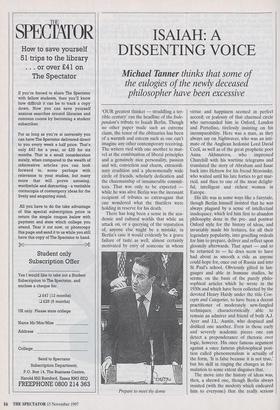ISAIAH: A DISSENTING VOICE
Michael Tanner thinks that some of
the eulogies of the newly deceased philosopher have been excessive
`OUR greatest thinker — straddling a ter- rible century' ran the headline of the Inde- pendent's tribute to Isaiah Berlin. Though no other paper made such an extreme claim, the tenor of the obituaries has been of a warmth and esteem such as one can't imagine any other contemporary receiving. The writers vied with one another to mar- vel at the combination of liberal principles and a genuinely nice personality, passion and wit, conviction and charm, extraordi- nary erudition and a phenomenally wide circle of friends, scholarly dedication and the chairmanship of innumerable commit- tees. That was only to be expected while he was alive Berlin was the incessant recipient of tributes so extravagant that one wondered what the thurifers were holding in reserve for his death.
There has long been a sense in the aca- demic and cultural worlds that while an attack on, or a querying of the reputation of, anyone else might be a mistake, in Berlin's case it would evidently be a grave failure of taste as well, almost certainly motivated by envy of someone in whom Prepare to meet thy dome
virtue and happiness seemed in perfect accord; or jealousy of that charmed circle who surrounded him in Oxford, London and Portofino, tirelessly insisting on his incomparability. Here was a man, as they always say on Nightwaves, who was an inti- mate of the Anglican hedonist Lord David Cecil, as well as of the great prophetic poet Anna Akhmatova, who impressed Churchill with his wartime telegrams and translated the story of Abraham and Isaac back into Hebrew for his friend Stravinsky, who waited until his late forties to get mar- ried, and then to one of the most delight- ful, intelligent and richest women in Europe.
His life was in some ways like a fairytale, though Berlin himself insisted that he was always plagued by a sense of intellectual inadequacy, which led him first to abandon philosophy done in the pre- and postwar Oxford style for the history of ideas, and invariably made his lectures, for all their legendary popularity, into gruelling ordeals for him to prepare, deliver and reflect upon gloomily afterwards. That apart — and to be returned to — he does seem to have had about as smooth a ride as anyone could hope for, once out of Russia and into St Paul's school. Obviously gifted in lan- guages and able in humane studies, he seems, on the basis of the purely philo- sophical articles which he wrote in the 1930s and which have been collected by the devoted Henry Hardy under the title Con- cepts and Categories, to have been a decent practitioner of moderately new-fangled techniques; characteristically able to remain an admirer and friend of both A.J. Ayer and J.L. Austin, who despised and disliked one another. Even in those early and severely academic pieces one can detect a preponderance of rhetoric over logic, however. His once famous argument against a once famous philosophical posi- tion called phenomenalism is actually of the form, 'It is false because it is not true,' but his skill in ringing the changes in for- mulation to some extent disguises that.
The move into the history of ideas was, then, a shrewd one, though Berlin always insisted (with the modesty which endeared him to everyone) that the really serious Work was done by philosophers. What is interesting about the ideas whose history he studied was that he invariably traced their provenance to figures who were vir- tually unheard of in the Anglo-Saxon world, and usually untranslated, at any rate since the middle of the last century. This meant that his accounts of them had to be, in the strict sense, introductory. His main reason for studying them, apart from their obscurity, was that as a liberal he found liberals boring, and therefore liberal-mind- edly wrote about reactionaries, as if they were intellectual de Sades. In his lectures on them he managed to communicate his own excitement at encountering such repulsive figures, but anyone who felt inspired — many did — to read them soon discovered that they were a good deal less interesting than Berlin, by canny quotation or summary, had made them sound. In fact his accounts were highly selective and often superficial, but the breathlessness of that famous style concealed that from lis- teners and readers.
That famous style was a matter, orally, of keeping going at an estimated 400 words per minute. One of Berlin's most effective mannerisms was to repeat a whole sentence except for the last word: `Famann absolutely denied the existence of le, where x might take seven values in suc- cessive sentences, so the impression would be of an avalanche. To audiences used to listening for the validity of arguments, it was an exhilarating relief to be instructed simply in the scandalous beliefs (as it would be taken for granted on both sides of the lectern that they were) of forgotten thinkers who went 'Against the Current' — the title of Berlin's best-known collec- tion of essays — by a man who, to all intents and purposes, was the current.
The English, it seems, always like a glamorous cultural figure or group about whom they can fantasise: high thinking and high living combined. The Blooms- bury Group filled that role perhaps better posthumously than when they were still active, but they have turned out to be a rather gamy crew, which partly accounts for their seemingly unending fascination. Berlin appears to have been a man of blameless private life, yet not in the least priggish or dull, with a rich store of well- honed anecdotes and bons mots, and a semi-Johnsonian downrightness. Like Johnson, too, he had cultural tastes which were reassuringly conservative, and his musical passions were Bach, Schubert, Verdi — depth and skill, lyric surfaces with tragic undertones and tunefully reso- lute love of freedom. His much-reprinted essay on Verdi is a characteristic piece, circular in form, advocating a rather obvi- ous thesis, using terminology from Schiller in a loose way, genial but with a sense of indignation against anyone disagreeing with such nourishing truthfulness as the composer and his expounder represent.
Berlin was a comfort to anyone alarmed by philosophical obscurities coming from contemporary Continental heavyweights, too. His typical procedure with anyone expressing an admiration for say, Adorno, was to ask for one clear and true proposi- tion which he had espoused — a test which Plato or Kant would certainly have trouble passing. It's interesting to note in Conversa- tions with Isaiah Berlin how the fact that he is unable to understand Adorno is auto- matically taken to reflect on Adorno and not on Berlin. That modesty only seems to have covered his own incapacity to gener- ate ideas, not his failure to appreciate them. Such a genial and in many ways gen- erous figure, with his delightful prejudices, yet grave sense of the painfulness of most people's lives, and his selective pluralism, was a phenomenon which we are unlikely to encounter again. That still, for me, leaves a gap between his achievement and his communication of his values, on the one hand, and his reputation on the other. The gap is clearly non-existent for most writers on him, and that in itself constitutes a remarkable tribute.
The author is fellow in philosophy at Corpus Christi College, Cambridge. His books include Nietzsche (OUP) and Wagner (HarperCollins).











































































 Previous page
Previous page